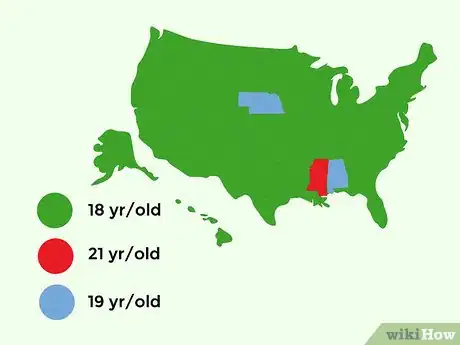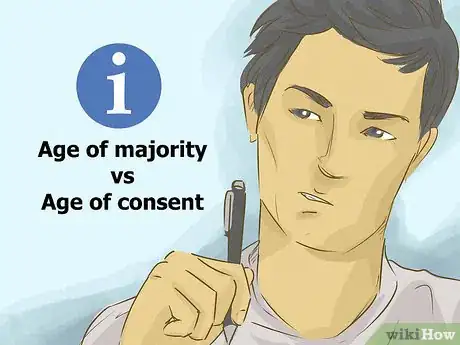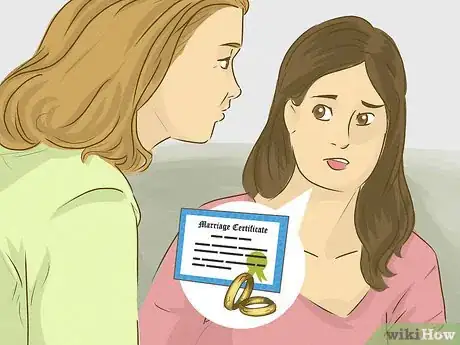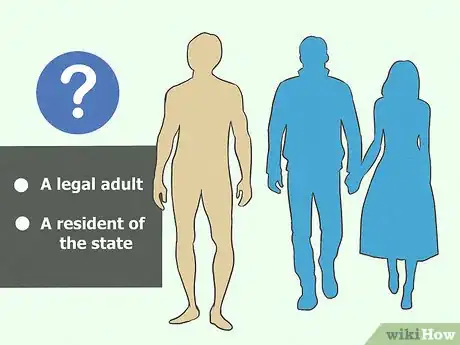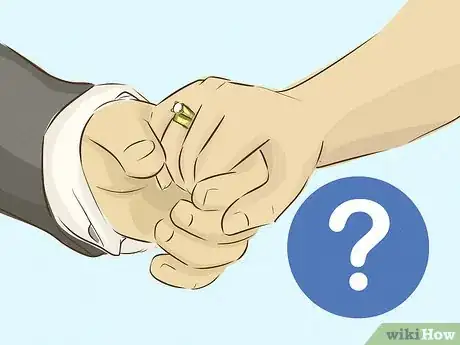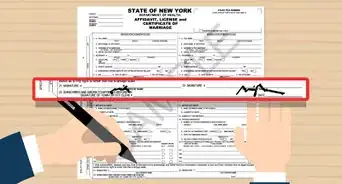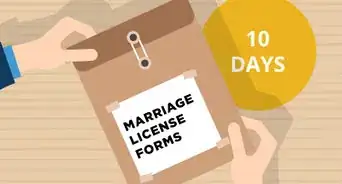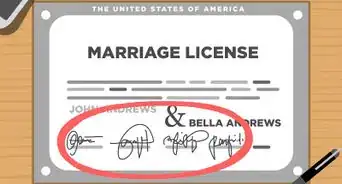This article was written by Jennifer Mueller, JD. Jennifer Mueller is an in-house legal expert at wikiHow. Jennifer reviews, fact-checks, and evaluates wikiHow's legal content to ensure thoroughness and accuracy. She received her JD from Indiana University Maurer School of Law in 2006.
There are 7 references cited in this article, which can be found at the bottom of the page.
This article has been viewed 63,792 times.
The age of majority is 18 in most states of America. This is the age that a person is considered old enough to enter into a contract, such as marriage. Once you reach the age of consent (often 16), then you can marry with parental consent. In some states, there are ways to get married without parental consent although in other states you simply must wait. If you don't live in the US these steps may still provide some general guidance.
Steps
Turning the Age of Majority
-
1Determine the age of majority in your location. The age of majority is the legal term for becoming an adult. It is the age at which you no longer need parental permission for things, such as getting married. In most states, the age of majority is 18. The following states have a higher age of majority:[1]
- Alabama – 19
- Mississippi – 21
- Nebraska – 19
-
2Distinguish the age of majority from the age of consent. The age of consent is much different from the age of majority, but the two are often confused. The age of consent is the age at which a person can legally consent to have sexual relations. It varies widely from state to state. Usually, both parties must be at least the age of consent to marry with parental consent. [2]Advertisement
-
3Get consent from only one parent. While most states require the consent of both parents, some states will allow minors to marry with the consent of only one parent. Those states include:[3]
- California
- Colorado (if only one parent has legal custody)
- Florida (if only one parent has sole custody)
- Idaho
- Kansas (if you also get judicial consent)
- Maryland
- Montana (if only one parent has legal custody)
- Nevada
- Pennsylvania
Obtaining a Judicial Bypass of Parental Consent
-
1Ask the court to allow you to marry without parental consent. In almost all states, the court can intercede and allow a minor to marry without consent. There must be extenuating circumstances, however, such as:[4]
- Pregnancy of an under-aged bride
- Potential for abuse of the minor if parental consent is sought
- Other things about the well being of the individuals wishing to marry or their children
-
2Find a next friend. In many states, a person who has not reached the age of majority must have a “next friend” or guardian ad litem file papers to open a case on their behalf. This shows the court that at least one adult believes your request has merit. A next friend usually must be:[5]
- A legal adult
- A resident of the state
- In some states, the next friend must also be a relative of the minor petitioning the court
-
3File and manage your case. The requirements and process will go something like this:
- The next friend files the petition and schedules the hearing
- The minor (often with the next friend) appears in court, telling the judge why the judge should grant permission for the minor to marry without obtaining the consent of the parent(s)
- The judge makes the ruling, either granting or denying the request.
Becoming Emancipated by Court Order
-
1Decide if legal emancipation is appropriate. Not all states allow for legal emancipation, and many states provide that married persons are granted automatic adult status. However, legally emancipated teens do not require parental consent to marry. Some benefits and drawbacks of becoming emancipated prior to marriage are:
- Both are judicial processes
- Parental notification is often required for emancipation, but not for judicial bypass
- In states that don’t automatically grant adult status to married persons, you may still need parental consent for certain activities.
-
2Determine if your state provides for emancipation by court order. Not all states allow teens to get emancipation by court order. Those that do have very strict requirements for it. States that allow emancipation include:[6]
- Alabama
- California
- Colorado
- Connecticut
- Florida
- Hawaii
- Illinois
- Kansas
- Louisiana
- Massachusetts
- Michigan
- Montana
- Nevada
- New Hampshire
- New Mexico
- North Carolina
- Oregon
- Rhode Island
- South Dakota
- Vermont
- Virginia
- Washington
- West Virginia
- Wyoming
-
3File and present your case. To obtain emancipation by court order, you must follow the legal procedure in your state. See How to Get Emancipated as a Teen. If you can afford one or one will represent you pro bono, an attorney would be very beneficial. Though the process will vary between states, some common components of the process include:[7]
- The petition. The petition is your request to the court. It says why you meet the requirements of the law to become emancipated and asks the court to grant you an order declaring you emancipated.
- Service on the parents. In most states, you must notify your parents of this petition. Get a summons or citation from the clerk and have it served by the sheriff or other designated officer according to state law. If serving the parents is likely to cause a dangerous situation for the child, a judge can waive this requirement.
- Hearing. The court will schedule a hearing to gather facts and evidence, hearing from the child, the parents, and any witnesses. The court will then make its decision and issue the appropriate order.
References
- ↑ http://legal-dictionary.thefreedictionary.com/Age+of+Majority
- ↑ http://www.legalmatch.com/law-library/article/age-allowed-to-get-married-without-parental-consent.html
- ↑ http://www.usmarriagelaws.com/search/united_states/teen_marriage_laws/
- ↑ http://apps.leg.wa.gov/RCW/default.aspx?cite=26.04.010
- ↑ http://legal-dictionary.thefreedictionary.com/Next+Friend
- ↑ https://www.law.cornell.edu/wex/table_emancipation
- ↑ http://www.nolo.com/legal-encyclopedia/emancipation-of-minors-32237.html
